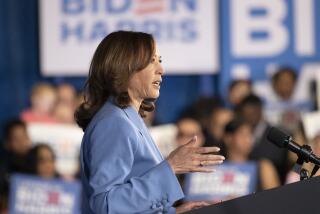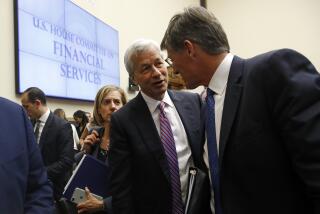WASHINGTON INSIGHT / Campaign ’96
- Share via
POLITICS: The Republican-dominated National Commission on Economic Growth and Tax Reform issued a report last month calling for a single tax rate and far fewer deductions. Now the commission is itself asking the Internal Revenue Service for tax-exempt status so taxpayers can deduct their donations to finance its operations. Republicans argue that the commission’s purpose is educational, not political, and is thus worthy of the same tax exemption given to educational organizations. Democrats, however, say the commission--headed by Republican Jack Kemp and set up last April by Senate Majority Leader Bob Dole and House Speaker Newt Gingrich--is blatantly political and not entitled to an exemption. The commission’s claim of educational intent, they say, is an attempt to step through the very kind of loophole that Republicans argue should be closed. “Was this truly a ‘national’ commission or was it merely another Republican front? The evidence to date suggests the latter,” Rep. John D. Dingell (D-Mich.) said. Kemp said he hoped the report would serve as a foundation “upon which our party can reach out to the American people.”
*
HE SAID THAT? The political spectrum is shuffling at warp speed this campaign season, with Republicans espousing traditional liberal, working-class themes and Democrats sounding more Reagan-like by the minute. So here’s a quiz (answers below). Match quotes to candidates: 1) Bill Clinton, 2) Steve Forbes, 3) Patrick J. Buchanan. A) About claims that the American economy is the strongest in 30 years. “I’d like you to tell that to a family where two incomes can’t seem to do the job that one did in previous generations.” B) “I also represent the working folks of this country who are losing their jobs because of things like . . . trade deals that sell out their interests to a bunch of guys on Wall Street who are . . . shutting down factories.” C) “This . . . is the way the federal government ought to relate to American citizens. We put up the money for police.. . . . And then we don’t tell anybody how to train the police, we don’t tell them how to deploy, we don’t tell them how to relate to the community. That’s all things that have to be decided at the local level.”
(ANSWERS: 1-C, 2-A, 3-B)
*
SLOW LANE: President Clinton’s notoriously squishy schedule left some communications industry leaders miffed last week as they waited captive-like for the chief executive at a ceremony to sign telecommunications reform legislation. Clinton arrived half an hour late for the event, held Friday at the Library of Congress. Afterward, in a customary security precaution, the audience was asked to remain seated until Clinton left the building. But instead of exiting, he went into a holding room and joked around for some time before his departure freed the business executives.
*
CRASH LANDING: Among all the miscalculations that ended Texas Sen. Phil Gramm’s bid for the Republican presidential nomination last week, one was probably unique. He became the first candidate for the White House to charter a plane to his own political funeral. Gramm arranged for the charter flight to make it easier for reporters in Iowa covering the campaign for that state’s caucuses to go to Baton Rouge for Louisiana’s caucuses, which Gramm confidently expected to win. The idea worked all too well. Reporters eagerly signed on, assuring nationwide coverage of the contest between Gramm and Buchanan. But instead of victory, Gramm suffered a stunning defeat at the hands of Buchanan, a loss that effectively ended his presidential hopes.
More to Read
Get the L.A. Times Politics newsletter
Deeply reported insights into legislation, politics and policy from Sacramento, Washington and beyond. In your inbox twice per week.
You may occasionally receive promotional content from the Los Angeles Times.










